
Helpful Advice for Owners Caring for a Senior Pet
Share
At times, it can feel as though your pet will live forever. With each passing year, their vitality and energy seem to remain the same. However, at some point, there is always a noticeable change when your pet transitions from their young, jovial self into a senior pet. They start walking more slowly, their minds don’t seem to be as sharp, and they have trouble doing basic things like eating and drinking. When this inevitable period arrives, it’s important for owners to do everything in their power to make the senior years of their pet’s life more comfortable and enjoyable. Let’s take a look at small changes that can be made throughout the house.
Make their food and water easily accessible.
When senior pets aren’t sleeping or relieving themselves, they’re usually eating. What used to be an exciting and manageable process becomes more difficult and sometimes painful for older pets. Making their food and water more accessible is an excellent way to help your pet reserve energy and encourages them to eat regularly. Having bowls lower to the ground and with anti-skid gripping on the bottom can make it easier for pets to eat without moving too much. You should also place your senior pet’s food somewhere that’s easily accessible and ideally close to where they spend most of their time.
Invest in an orthopedic bed.
Senior pets behave very similarly to their older human counterparts. For example, it’s common for older dogs to sleep 16 or 18 hours each day. Ideally, this sleep is happening in a comfortable bed that isn’t contributing to your pet’s health complications. Investing in an orthopedic bed ensures that your pet is getting sufficient sleep that his or her age requires without having the negative effects of a stiff and uncomfortable bed. There are several different styles from which to choose, but you only need to make sure that the dimensions are appropriate for the size of your pet.
Limit their need to go upstairs.
Arthritis, joint pain, and difficulty moving are all telltale signs that your pet is entering into his or her golden years. Since stairs are already awkward for pets that are healthy, these obstacles present a major issue for senior animals. Unfortunately, many pets will follow their owners up the stairs every time despite the pain in order to be close to their loved ones. To help protect your pet, consider limiting the number of trips you take up and down the stairs. And if your pet has trouble climbing onto the couch or into the car, a pet ramp can be a great way to help them have accessibility.
Handle accidents with cleaners and probiotics.
Accidents are inevitable with seniors pets as their bladders become more difficult to control. No need to fret: Owners can turn toward cleaners that contain enzymes to treat urine spots on carpeting. You can also use vinegar and baking soda for other stains and let it sit before you bring out the vacuum cleaner. Since diet also plays a big role in the frequency and intensity of these accidents, you might want to consider giving your older pet probiotics to aid in digestion while also improving the immune system. While it’s important to talk with your vet before adding any supplements to your pet’s diet, you should also rely on customer reviews and online guides to make sure you’re buying the best probiotic.
Pets show their owners unconditional love from the very beginning until the very end. It’s important to return that loyalty by ensuring the senior years of your pet’s life are comfortable, happy, and fulfilling. Small actions can go a long way in this effort, and your pet will certainly take notice.

